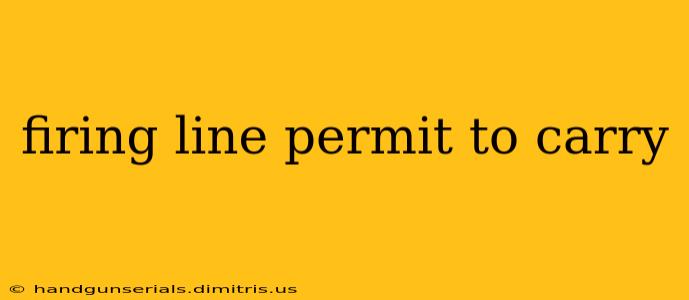Obtaining a permit to carry a firearm can be a complex process, varying significantly by state and even locality. While the term "firing line permit" isn't a standardized legal term, it likely refers to permits allowing concealed carry at shooting ranges or during organized shooting events. This guide clarifies the nuances of permits related to firearm possession and use in specific contexts, helping you understand the regulations and how to obtain the necessary authorization. It's crucial to remember that gun laws are intricate and change frequently; this information is for general understanding and does not constitute legal advice. Always consult with local law enforcement or a qualified legal professional for the most accurate and up-to-date information in your area.
What Does "Firing Line Permit" Imply?
The phrase "firing line permit" suggests a permit specifically for carrying a firearm at a designated shooting range or during sanctioned shooting competitions. This differs from a standard concealed carry permit, which typically grants permission to carry a concealed handgun in public places. While some states may have specific permits for range use, others might incorporate this permission within a broader concealed carry permit or license.
Understanding the Differences: Concealed Carry vs. Range Use
-
Concealed Carry Permits: These permits authorize the carrying of a concealed handgun in public areas, subject to the specific regulations of the issuing jurisdiction. Restrictions often include prohibited locations (schools, government buildings, etc.) and specific requirements on the type of firearm and its carrying method.
-
Range Use Permits (Implied or Explicit): Some states might have separate permits or endorsements for range use, while others might implicitly allow it under a standard concealed carry permit. This often depends on the range's specific regulations and the state's overall gun laws. A range may require additional documentation or proof of permit possession.
The Application Process: A General Overview
The process for obtaining a permit to carry a firearm—whether it's a general concealed carry permit or a permit specifically for range use—varies greatly depending on your state and local laws. Generally, the process involves:
1. Meeting Eligibility Requirements:
This often includes:
- Age restrictions: You must be at least 21 years old in most jurisdictions.
- Background check: A thorough background check will be conducted to ensure you don't have a criminal record or history of mental health issues that would disqualify you.
- Training requirements: Some states mandate the completion of a firearms safety course before issuing a permit.
- State residency: You typically need to be a resident of the state where you're applying.
2. Application Submission:
The application typically involves completing a form, providing identification, and submitting fingerprints.
3. Background Check Processing:
This can take several weeks or even months, depending on the jurisdiction's workload and the complexity of your background.
4. Permit Issuance (or Denial):**
If you meet all requirements, your permit will be issued. If not, you'll receive a notification explaining the reason for denial.
Navigating the Legal Landscape: State-Specific Regulations
The regulations surrounding firearm permits vary dramatically across states. Some states have "shall-issue" laws, meaning that permits are issued to all applicants who meet the requirements. Others have "may-issue" laws, providing law enforcement with discretion to approve or deny applications.
It's crucial to research the specific laws in your state. Contact your local sheriff's office or state police department for the most accurate and up-to-date information on permits related to firearm use at shooting ranges or in other specific contexts.
Safety First: Responsible Gun Ownership
Regardless of the permit you possess, responsible gun ownership is paramount. Always prioritize safety and adhere to all applicable rules and regulations. Familiarize yourself with safe gun handling practices, proper storage procedures, and the laws governing firearm use in your area. Never hesitate to seek professional training and guidance to ensure safe and responsible gun ownership.
Disclaimer: This article provides general information and should not be considered legal advice. Consult with a legal professional or your local law enforcement agency for guidance on specific permit requirements and regulations in your area.

